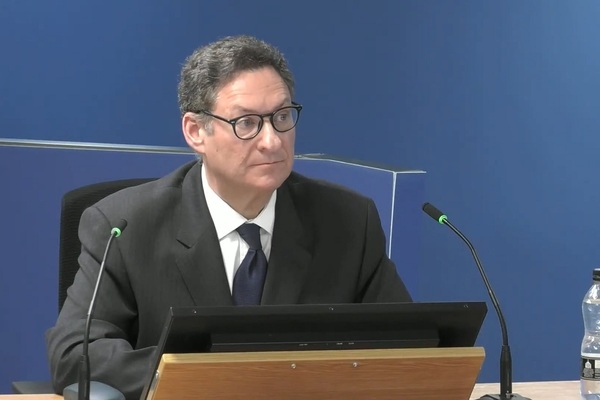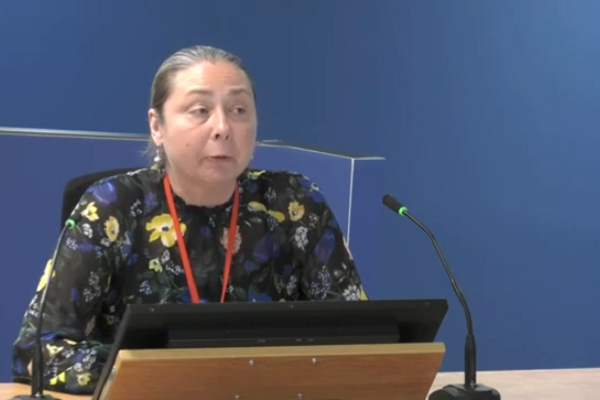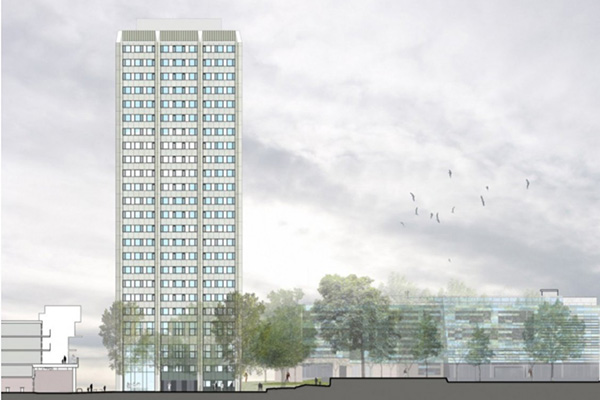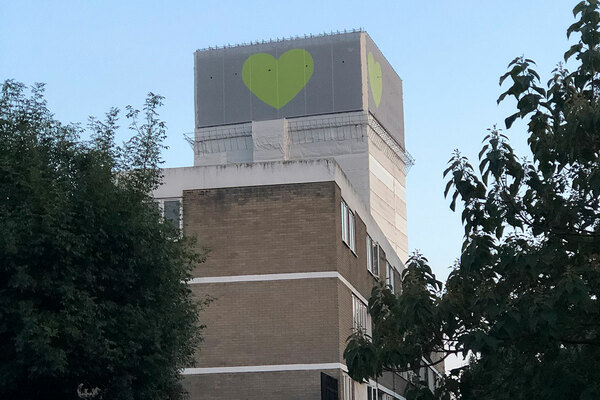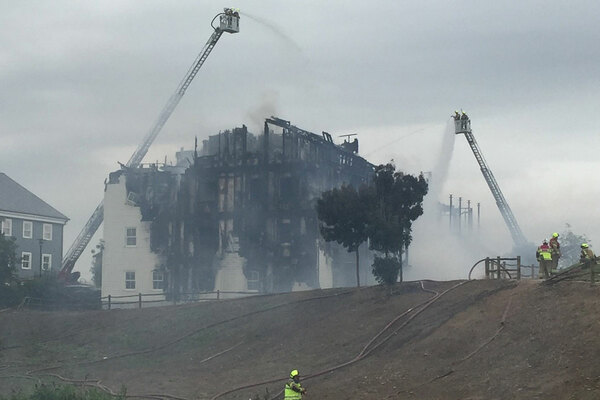Grenfell Tower Inquiry diary week 35: ‘I really didn’t like the champagne’
This week the Grenfell Tower Inquiry saw council witnesses, including former deputy leader Rock Feilding-Mellen and leader Nicholas Paget-Brown, questioned about their role in the story for the first time. Peter Apps reports
The names Rock Feilding-Mellen and Nicholas Paget-Brown have been synonymous with the Grenfell Tower story since the media coverage in the very first days after the fire.
This week, almost four years on, they were questioned about their actions for the first time, along with a number of other witnesses from the Royal Borough of Kensington and Chelsea (RBKC).
‘Something appears to have been inserted to make this less robust than the politicians would have intended’
A consistent backdrop to this week's evidence was the issue of estate regeneration.
At the time Grenfell Tower was refurbished, many west London council estates were in the process of being demolished and rebuilt with more private housing and some residents of the tower feared this was the council’s ultimate plan for them. This week’s evidence suggested that these fears were well founded.
The inquiry heard that Mr Paget-Brown (pictured above) and Mr Feilding-Mellen “shared many objectives and priorities” with regard to housing in the borough. Estate regeneration appeared to be a key one of these objectives.
Mr Feilding-Mellen said he had a “political interest” in regeneration and that he had a “notion that the regeneration of council estates was one of the ways in which the council could play its part in trying to increase the amount of affordable housing”.
Indeed, when he first heard of plans to refurbish Grenfell Tower he said that due to his “interest in regeneration generally”, he made immediate enquires to ensure the refurbishment would not “hinder or obstruct any future potential regeneration of the whole Lancaster West Estate”.
This was a reference to a draft masterplan for the area, commissioned in 2009, which recommended demolishing “most of the existing housing” to make way for new build. It specifically singled out Grenfell Tower for demolition, saying its “appearance… blights much of the area”.
Jonathan Bore, who worked for the consultancy that wrote the report, had by this point been named executive director of planning at RBKC.
Mr Feilding-Mellen said he was reassured that the refurbishment was necessary to improve the tower in the shorter term and emailed Laura Johnson, director of housing at RBKC, in April 2012 to say he was “glad to hear you are keeping the bigger, longer-term potential [for the estate] in mind”.
Later, in October 2013, when Mr Paget-Brown was responding to concerns from Grenfell resident Eddie Daffarn about the refurbishment, Mr Feilding-Mellen emailed him to advise that the discussion be “focused on the future and about what changes are necessary/desirable on the whole Lanc West estate”. He added: “We could also usefully discuss the subject of tenants’ right to return and any potential decant policies etc.”
Mr Paget-Brown responded: “Some of the points in an extreme form may be representative of the more general arguments that will come up once we get nearer to proposing some actual estate renewal. Is it so bad to have a ‘dry run’?”
Asked about these meetings with Mr Daffarn when he gave evidence, Mr Paget-Brown said that – among other things – he wanted to “put him [Mr Daffarn] right” with regard to accusations that he planned ‘social cleansing’ for the estate, accusations which he described as “ludicrous” and “over-hyped”.
Mr Daffarn had expressed concern that tenants would not be guaranteed a ‘right to return’ if the estate was demolished. Mr Paget-Brown insisted to the inquiry that this was untrue.
“I’d insisted right from the beginning that if we were going to do refurbishments or regenerations of estates, which we were going to have to do, there must be a right for all tenants and leaseholders to return,” he said. “There was no way we would proceed unless that happened, otherwise there would be social cleansing, which we were very strongly opposed to.”
Awkwardly, he was then shown the borough’s actual decant policy which showed that Mr Daffarn was right: it specifically said a right to return “cannot be guaranteed” for residents post-demolition.
“Something appears to have been inserted to make this less robust than the politicians would have intended,” said a surprised Mr Paget-Brown when he was shown the document. “I don’t quite know how that got in there, but it’s certainly not our view. Our view was that the right to return was unconditional.”
He accepted, when questioned, that Mr Daffarn may in fact have had a point.
At the end of his evidence, Mr Paget-Brown said the fire had taught him tower blocks were not “the happiest places to live” and that “mansion blocks, which do exist in a large part of Kensington and Chelsea... would be a better model for future housing”.
‘I really didn’t like the champagne’
Mr Feilding-Mellen (pictured above) hit the headlines after the fire when an email was leaked to The Sunday Times which made a reference to providing him with “good costs” in a meeting over the choice of cladding in July 2014.
The cladding was, of course, switched from a safe, non-combustible zinc to the violently combustible aluminium composite material (ACM) to save around £500,000 and the suggestion had been that this was to satisfy Mr Feilding-Mellen’s desire for a tight budget.
The inquiry heard this week that meeting did not take place, and we know the decision to switch had been made much earlier. By July 2014, the refurbishment team was simply seeking approval from the planning department for this move.
But Mr Feilding-Mellen did get involved in this debate. He said he did so in order to hurry the planners to make a decision, reacting to complaints from residents about delays to the refurbishment.
Emails released this week, however, show him taking a close interest in the choice of colour between “brushed aluminium”, “champagne” and “battleship grey”.
“I really didn’t like the ‘champagne’,” he wrote in one email. “Let me know if I need to speak to Planners.”
He later expressed a preference for the battleship grey (“not champagne!”). He then sarcastically responded when an architect disagreed with his colour preference (“if she is the great arbiter of what is a good choice, I would like to know her opinion”) and even suggested the panels around the entrance should be “a deeper/darker British Racing green”.
Asked why he was offering his “personal subjective view” on these matters, Mr Feilding-Mellen: “This was a subjective judgement call, where I would say my view was as valid as anyone else’s. I was willing to proffer my view.”
He stressed that he had emphasised a need to stop arguing about the colour and make a decision.
The emails also show the switch from zinc to ACM was mentioned, but he said this “did not register”. “I didn’t know the difference between aluminium or zinc, it didn’t mean much to me,” he said.
The emails also show him saying the cladding should be fixed to the tower using a more expensive ‘cassette’ method favoured by the planners because “it will look better”. We now know that this choice of fixing method severely reduced the fire performance, although this was not known at the time.
But while colour was picked over, safety was not discussed. “Did anybody express any concerns about fire safety in respect of the choice of cladding?” asked Richard Millett QC, counsel to the inquiry.
“It was never raised to me that there was any question of fire safety in this discussion,” replied Mr Feilding-Mellen.
‘You were making exactly the assumption that this document advised you should not make’
Fire safety was raised more generally with both Mr Feilding-Mellen and Mr Paget-Brown. In 2009, a fire at council-owned Lakanal House in Southwark killed six people – sending shockwaves through the social housing sector.
“I think I had heard of it,” said Mr Feilding-Mellen, when asked about the fire this week. But he had not read the coroner’s recommendations in 2013.
In July 2014 he was sent documents prepared by the London Fire Brigade (LFB) which advised councillors on what their approach to fire safety should be in order to prevent a repeat of the disaster. These guides outlined various questions to ask when visiting council homes and specifically set out guidance on what to consider when blocks were being refurbished.
“Did you not look to see whether there was anything in these documents which covered what you should do as a councillor in respect of fire safety where one of the buildings in your stock, or the TMO’s [Kensington & Chelsea Tenant Management Organisation] stock, was being refurbished?” asked Mr Millett (pictured above).
“No. I failed to do that, and based on what I know has happened, I regret having failed to do that,” Mr Feilding-Mellen replied. “I at the time was conscious that there were many layers of people with what I thought was the relevant expertise and indeed the role to check the health and safety generally, including fire safety aspects, of a refurbishment project like this.”
He was then shown a passage of the guidance which specifically advised “not to make assumptions” that fire safety was being properly dealt with.
“On what you have told us this morning, Mr Feilding-Mellen, you were making exactly the assumption that this document advised you should not make,” said Mr Millett.
“That appears to be the case,” replied Mr Feilding-Mellen.
Mr Paget-Brown meanwhile was contacted by the LFB in January 2015 with a letter that warned him over the fire risks associated with refurbishment projects, listing several real-world examples and suggesting the use of an ‘audit tool’ to ensure safety.
He sent this on to the planning department, but not the team who were at that stage engaged in refurbishing Grenfell Tower. Why not?
“Work was, I think, by now well under way and Grenfell Tower had hired fire safety consultants… so I didn’t think we needed to worry about Grenfell – that was being taken care of,” Mr Paget-Brown said.
In fact, the fire safety consultants had by this stage been dropped from the project without completing their report on the impact of the new cladding plans.
‘This [the refurbishment] is essentially a £100k gift from the state’
Another major theme this week was the scrutiny of fire safety in RBKC undertaken by the housing and property scrutiny committee, a group of councillors engaged to scrutinise the council and KCTMO’s in the performance of their duties.
Quentin Marshall (pictured above), chair of this committee until 2016, told the inquiry that he found the scrutiny process “frustrating” and said the committee was often provided with “insufficient or inadequate” information and time to properly do its job.
A particular period where the scrutiny committee’s work came into focus was in early 2016, when it considered a petition presented by Mr Daffarn and signed by dozens of residents of the tower raising concerns about the refurbishment works, which said residents concerns had been “ignored or downplayed” and called for an independent review to ensure “lessons were learned”.
We saw emails exchanged in the build up to this session where Mr Feilding-Mellen said the disruption caused by the refurbishment was “the inevitable price that must be paid by the residents in order to have their flats brought up to very good, modern standards”. He questioned whether KCTMO had “manpower or resources” to investigate and added they should avoid “focusing predominantly wherever the loudest complaints are coming from”.
Mr Marshall replied that he would prefer an oral hearing rather than a formal report on the refurbishment. “I’m sure a majority of members could be pre-briefed to understand how to play it,” he wrote. He denied that he made any efforts to instruct his colleagues on the committee how to act.
The upshot was that KCTMO was asked to provide a report into itself, which ultimately concluded the project had been well handled.
But when Robert Black, chief executive of KCTMO, appeared at a later session of the committee to answer questions about it, he refused to provide the report – branding it confidential.
Mr Marshall said this was not unusual behaviour from KCTMO. “They would assert that these documents were confidential to them and... we didn’t have the right to [force them to] disclose things,” he said.
In March 2016, before the committee had completed its investigation into the matter, Mr Marshall wrote to local Conservative MP Victoria Borthwick about the residents’ concerns.
“This [the refurbishment] is essentially a £100k gift from the state. I’m therefore not massively sympathetic to general ‘it’s all terrible’ complaints,” he wrote, adding that the complaints were “grossly exaggerated” and “should be taken with a large pinch of salt”.
“To the lay eye, [these comments] may tend to suggest that you had formed a relatively firm view at this stage; would you agree with that?” asked counsel to the inquiry Andrew Kinnier QC.
Mr Marshall emphasised that he had also said in the email that the works to the tower were not “absolutely perfect”.
‘We’ve been through this before and I refuse to open this up again’
The work of the scrutiny committee was also examined in relation to a fire at Adair Tower, situated around a mile from Grenfell, in 2015.
This fire, as we have previously heard, triggered a block-wide evacuation when smoke spread through the common parts of the building.
The scrutiny committee asked Mr Black to account for it when he appeared before them in November. But his evidence omitted a crucial fact: two weeks before the fire, the LFB had issued a deficiency notice on the block.
Asked if it should have been brought to the committee’s attention, Samuel Mackover (pictured above), chair of the committee from 2016 onwards, said: “Absolutely… This is one of the most important things for us to know, if there is any problem like that at all.”
A further deficiency notice would be served for Grenfell Tower in November 2016, which specifically referenced missing fire door self-closers – a major fault on the night of the fire. This too was not mentioned to the committee by Mr Black or director of housing Ms Johnson.
In March 2017 there was another fire, this time in Trellick Tower – another block owned by KCTMO.
Despite this fire not spreading, this provoked questions about the performance of fire doors, which had recently been replaced by KCTMO across the borough. On hearing there were still defective doors, Mr Mackover reacted “strongly” and requested a report into the issue.
This provoked an email exchange between Ms Johnson and Mr Black on May 17 2017 – less than a month before the fire.
“In short Cllr Mackover knows nothing about this issue… We’ve been through this before and I refuse to open this up again as a subject for Cllr Pascal [another member of the scrutiny committee] to dwell on,” Ms Johnson wrote.
“It’s a non-issue they are trying to turn into something because we’ve reported on it before,” she added.
Shown the emails this week, Mr Mackover said they were “surprising”. He called Ms Johnson a “high-quality officer” and said this was a “departure from that”.
‘I’ve thought about this a lot and I can’t recall why it was removed’
The inquiry also heard evidence this week from Amanda Johnson (pictured above), head of housing commissioning at RBKC at the time and responsible for overseeing the work of KCTMO.
Among several issues, she was asked about how KCTMO’s performance was monitored in terms of the number of complaints made by residents.
She was shown documents from 2011/12 and 2012/13 that showed there was no ‘key performance indicator’ (KPI) in place for the number of resident complaints received. Asked why it was missing, she said: “We should have had a complaints KPI. It shouldn’t have been excluded.”
After this point, data did begin to be collected on complaints, but only the volume of initial complaints, nothing about how they were handled.
Ms Johnson was also shown a performance report from 2014/15 where the actual data on complaints appeared to have been removed.
“Can you help us as to why [that measure] was removed?” asked Mr Kinnier.
“I can’t. I’ve thought about this a lot and I can’t recall why it was removed, it shouldn’t have been removed.”
“But you accept it was?” he asked.
“Yes,” Ms Johnson replied.
She was then shown emails from Peter Maddison, director of assets at KCTMO, which showed him recategorising complaints relating to Grenfell Tower as “members inquiries”, the technical phrase for queries from local councillors. This would have kept them out of the audit figures.
Asked if this practice could have resulted in an “under-reporting of complaints”, Ms Johnson replied that “it could have done”.
There was also evidence from Judith Blakeman, Grenfell Tower’s local ward councillor, which we will pick up in next week’s diary, and dozens of witness statements from former residents of the tower which were read into the record. We will report on these in a special article in the coming weeks.
Grenfell Tower Inquiry headlines: week 35
RBKC housing director refused to discuss ‘non-issue’ of fire doors
The director of housing at the Royal Borough of Kensington and Chelsea criticised internal scrutiny of the standard of fire doors in the borough as a “non-issue” and said she would “refuse to open it up again” just weeks before the fire at Grenfell Tower.
The former leader of the Royal Borough of Kensington and Chelsea described claims that residents from regenerated estates would not be guaranteed to return as “ludicrous” and “over-hyped”, before being shown a policy document that confirmed this was the case.
Grenfell council lead says he ‘does not know’ of anything he could have done differently
The councillor responsible for housing during the Grenfell Tower refurbishment has said he “does not know” of anything he could have done differently in relation to the tower’s fateful refurbishment.
RBKC councillor weighed in to Grenfell cladding decision to push against ‘champagne’ colour choice
A senior councillor at the Royal Borough of Kensington and Chelsea intervened in a debate about switching to the cheaper, combustible cladding for Grenfell Tower to argue that he did not like the colour choice of champagne.
Grenfell Tower Inquiry phase two: weekly diaries
Module one: the refurbishment
Week one: A vivid picture of a broken industry
After a week of damning revelations at the opening of phase two of the Grenfell Tower Inquiry, Peter Apps recaps the key points
Click here to read the full story
Week two: What is the significance of the immunity application?
Sir Martin Moore-Bick has written to the attorney general requesting protection for those set to give evidence at the Grenfell Tower Inquiry. Peter Apps explains what the move means
Click here to read the full story
Week three: Architects of misfortune
This week saw the lead architects for the Grenfell Tower refurbishment give evidence to the inquiry. Peter Apps runs through the key points
Click here to read the full story
Week four: ‘I didn’t have any perception that it was the monster it’s become’
The architects continued to give evidence this week, outlining a lack of understanding of the fire risk posed by the cladding materials and its design. Nathaniel Barker reports
Click here to read the full story
Week five: ‘No adverse effect in relation to external fire spread’
As the Grenfell Tower Inquiry returns from its long absence, Peter Apps recaps the key points from a week of important evidence from the fire consultants to the refurbishment
Click here to read the full story
Week six: ‘I can’t recall any instance where I discussed the materials with building control’
Nathaniel Barker summarises what we learned from fire engineers Exova, architects Studio E and the early evidence from contractor Rydon
Click here to read the full story
Week seven: ‘I do not think I have ever worked with a contractor operating with this level of nonchalance’
Two key witnesses from contractor Rydon gave evidence this week. Peter Apps recaps some of the key points from a revealing week of evidence
Click here to read the full story
Week eight: ‘It haunts me that it wasn't challenged’
Four witnesses from contractor Rydon gave evidence this week. Lucie Heath recaps what we learned on the last week of evidence before the inquiry breaks for five weeks
Click here to read the full story
Week nine: ‘All I can say is you will be taken out for a very nice meal very soon’
This week the inquiry heard evidence from witnesses at Harley Facades, the sub-contractor responsible for Grenfell Tower’s cladding. Peter Apps recaps the key points
Click here to read the full story
Week 10: ‘As we all know, ACM will be gone rather quickly in a fire!’
As the Grenfell Tower Inquiry entered its 10th week, Jack Simpson recaps the key points from a week of important evidence from the refurbishment’s cladding contractor
Click here to read the full story
Week 11: ‘Did you get the impression Grenfell Tower was a guinea pig for this insulation?’
With witnesses from the cladding subcontractor, the firm which cut the deadly panels to shape and the clerk of works which inspected the job giving evidence this was week full of revelations. Peter Apps recaps the key points
Click here to read the full story
Week 12: ‘Would you accept that was a serious failing on your part?’
With the surveyor who inspected Grenfell Tower for compliance giving evidence, this was a crucial week from the inquiry. Dominic Brady and Peter Apps report
Click here to read the full story
Week 13: ‘Value for money is to be regarded as the key driver for this project’
With consultants to Kensington & Chelsea Tenant Management Organisation (KCTMO) giving evidence, attention at the Grenfell Tower Inquiry turned for this first time to the actions of the TMO and the council. Peter Apps reports
Click here to read the full story
Week 14: ‘Did it not occur to you at this point that your budget was simply too low?’
This week, for the first time in phase two, the inquiry heard from Kensington & Chelsea Tenant Management Organisation, the landlord that oversaw the fatal refurbishment of Grenfell Tower. Lucie Heath reports
Click here to read the full story
Week 15: ‘Have you ever informed the police that you destroyed documents relevant to their investigation?’
Witnesses from the Kensington and Chelsea Tenant Management Organisation (KCTMO) gave evidence for a second week, which began with a shocking revelation about withheld and destroyed evidence. Peter Apps recaps
Click here to read the full story
Week 16: ‘I conclude this was very serious evidence of professional negligence’
This week saw members of Kensington & Chelsea Tenant Management Organisation finish giving evidence, before the inquiry’s expert witnesses took the stand to make some highly critical assessments of the work they had seen before and during the refurbishment of Grenfell Tower. Jack Simpson recaps
Click here to read the full story
Grenfell Tower: a timeline of the refurbishment
Following the conclusion of module one of the Grenfell Inquiry’s second phase, Peter Apps presents a timeline of the key moments during the fatal refurbishment of the west London tower block
Click here to read the full story
Module two: the cladding products
Week 17: ‘It’s hard to make a note about this because we are not clean’
The start of the second module of the Grenfell Tower Inquiry phase two came with some huge revelations about the companies that sold the products used in the cladding system. Peter Apps reports
Click here to read the full story
Week 18: ‘It was just reckless optimism wasn't it?’
As the inquiry began cross-examining witnesses for the second module of its phase two work, the picture surrounding just how Grenfell Tower ended up wrapped in such dangerous materials became a little clearer. Nathaniel Barker was keeping an eye on proceedings
Click here to read the full story
Week 19: ‘And that was intentional, deliberate, dishonest?’
The Grenfell Tower Inquiry this week heard the shocking story of how the insulation manufacturer “manipulated” official testing and marketed its product “dishonestly”. Peter Apps tells the story
Click here to read the full story
Week 20: ‘We were outed by a consultant who we then had to fabricate a story to’
This week the inquiry investigated the actions of Kingspan – the manufacturer of one of the insulation products used in the tower’s cladding system. Dominic Brady reports
Click here to read the full story
Week 21: ‘It’s there in black and white isn't it? We see a complete absence of any consideration of life safety’
The story of insulation giant Kingspan’s testing and marketing of its combustible insulation for high rises was unpacked in minute detail this week. Peter Apps reports
Click here to read the full story
Week 22: ‘All we do is lie in here’
In the third week of evidence from insulation giant Kingspan, the inquiry continued to uncover shocking details about the firm’s behaviour both before and after the Grenfell Tower fire. Lucie Heath reports
Click here to read the full story
Week 23: ‘That would have come as an earthquake to you at the time, would it not?’
This week the inquiry took its deepest dive yet into the inner workings of the cladding manufacturer whose product has been blamed for the terrible spread of fire up Grenfell Tower. Nathaniel Barker reports
Click here to read the full story
Week 24: ‘Do you accept that Test 5B was Arconic's deadly secret’
The president of the firm that made and sold the cladding panels installed on Grenfell Tower was asked to account for the apparent concealment of “disastrous” fire tests on the product this week. Peter Apps reports
Click here to read the full story
Week 25: ‘This is quite an incredible list of omissions and missed instances, isn’t it?’
This week the Grenfell Tower Inquiry heard its first witnesses from the Building Research Establishment (BRE) - the testing house which carried out key fire tests on the Kingspan and Celotex insulation products which were later used on Grenfell Tower. Peter Apps reports.
Click here to read the full story
Week 26: 'You were taking an enormous risk, weren't you?'
Week 26 at the Grenfell Tower Inquiry was a key moment in understanding how dangerous products used on the tower came to be accepted by industry professionals. Dominic Brady reports
Click here to read the full story
Week 27: ‘What will happen if one building made out [of] PE core is in fire and will kill 60 to 70 persons?’
The most explosive evidence this week at the Grenfell Tower Inquiry came from those who did not attend, as the evidence which would have been presented to Arconic witnesses was displayed in their absence. Peter Apps reports
Click here to read the full story
Week 28: ‘This is a serious safety matter’
This week the Grenfell Tower Inquiry zeroed in on the British Board of Agrément, the body that produced “misleading” certificates which inspired trust in both the cladding and insulation used on the tower. Lucie Heath reports
Click here to read the full story
Week 29: ‘Is it true that Kingspan’s position… was to do its best to ensure that science was secretly perverted for financial gain?’
The final week in this section of the Grenfell Tower Inquiry primarily examined the attempts by insulation manufacturer Kingspan to lobby government after the fire. Peter Apps reports
Click here to read the full story
How the products used in Grenfell Tower's cladding system were tested and sold
As the section of the Grenfell Tower Inquiry examining how the products used in the cladding system were tested, marketed and sold comes to a close, Peter Apps summarises what we have learned about each of the products included in the system
Click here to read the full story
Module Three: the management of the tower
Week 30: ‘There is certainly a high probability that in the event of a fire the whole building can become an inferno’
The focus of the inquiry shifted this week to the actions of the social housing providers responsible for maintaining Grenfell Tower. Pete Apps recaps what we learned
Click here to read the full story
Week 31: ‘If we cannot get out people will die’
This week saw the former residents of Grenfell Tower enter the witness box to tell of their experiences attempting to raise complaints with the council and its managing agent. Pete Apps reports
Click here to read the full story
Week 32: ‘Let's hope our luck holds and there isn't a fire’
This week saw the return of the landlord of Grenfell Tower, Kensington and Chelsea Tenant Management Organisation (KCTMO), as senior staff members attempted to explain how vital fire safety protections at the block were allowed to fall into disrepair. Lucie Heath reports
Click here to read the full story
Week 33: ‘Isn't that a serious gap in the scope of a policy meant to safeguard vulnerable people?’
A slightly disjointed week at the Grenfell Tower inquiry saw further evidence from staff at building manager Kensington and Chelsea Tenant Management Organisation (KCTMO) interspersed with the views of a cladding expert. Peter Apps reports
Click here to read the full story
Week 34: ‘Some members of the community are doing their best to spread false information’
Jack Simpson covers all the major revelations from the past week of evidence at the Grenfell Inquiry, including evidence from Laura Johnson, director of housing at the Royal Borough of Kensington and Chelsea.
Click here to read the full story
Week 35: ‘I really didn’t like the champagne’
This week the Grenfell Tower Inquiry saw council witnesses, including former deputy leader Rock Feilding-Mellen and leader Nicholas Paget-Brown, questioned about their role in the story for the first time. Peter Apps reports
Click here to read the full story
Week 36: ‘Is that not a very incurious approach for a fire risk assessor?’
This week the Grenfell Tower Inquiry scrutinised the work of Carl Stokes, the man hired to carry out fire risk assessments for the block. Nathaniel Barker reports
Click here to read the full story
Week 37: ‘In giving that advice, weren’t you acting beyond your knowledge and expertise?’
A curtailed week at the Grenfell Tower Inquiry saw fire risk assessor Carl Stokes grilled over advice he gave regarding the tower’s cladding. Peter Apps reports
Click here to read the full story
Week 38: ‘Well it’s a bit more than that, isn’t it. He’s suggesting that you tell the LFB a lie’
The inquiry heard the mammoth cross-examination of KCTMO’s health and safety manager Janice Wray this week. Peter Apps reports
Click here to read the full story
Week 39: ‘What you said there was a grotesque understatement’
This week the inquiry continued to hear from former employees of Kensington and Chelsea Tenant Management Organisation, as well as two employees from the London Fire Brigade. Lucie Heath reports
Click here to read the full story
Week 40: ‘An exercise in concealment and half-truth’
Former KCTMO chief executive Robert Black gave his evidence to the inquiry this week and was asked to account for the various failures described over the previous six weeks. Peter Apps and Nathaniel Barker report.
Click here to read the full story
Week 41: ‘We should do nothing. This is not the sort of website we should be responding to’
This week saw the return of Robert Black, chief executive of Kensington and Chelsea Tenant Management Organisation (KCTMO), before the inquiry turned its attention to the defective smoke control system in the tower. Dominic Brady reports
Click here to read the full story
Week 42:‘They would leak as much as they leaked. They were what they were’
The Grenfell Tower Inquiry continued its in-depth investigation of the tower’s non-compliant smoke control system this week, with evidence from the various contractors involved in delivering it. Pete Apps reports
Click here to read the full story
Week 43:‘Contractors at the time were not generally aware of the importance of leaving holes unsealed’
This week the inquiry focused on two of the more overlooked areas of the Grenfell Tower fire, with evidence focusing on the gas pipelines and lifts within the west London block. It was a packed week, with five witnesses giving evidence. Jack Simpson reports
Click here to read the full story
Week 44:‘I've never seen a fully compliant firefighting lift in any local authority building, to this day actually’
This week the inquiry turn the focus onto the building’s defective lifts, with evidence from an expert, contractors who worked on them and a former engineer at KCTMO. Pete Apps reports.
Click here to read the full story
Week 45: ‘Don’t you find all this rather a surprising debate, given that the Equality Act was passed in 2010?’
The inquiry heard from expert witness Colin Todd this week, who gave his views about the work of risk assessor Carl Stokes as well as answered questions about his own guidance. Peter Apps and Nathaniel Barker report
Click here to read the full story
Week 46: ‘I think I've been very, very clear that is completely wrong’
This week the inquiry heard further expert evidence about fire risk assessor Carl Stokes’ actions, as the section of its work covering the management and maintenance of the tower concluded. Peter Apps reports
Click here to read the full story
Six key failures in the way Grenfell Tower was managed before the fire
Peter Apps recaps some of what we have learned about the actions of the Royal Borough of Kensington and Chelsea (RBKC) and Kensington and Chelsea Tenant Management Organisation (KCTMO) in the years before the fire.
Module one and two closing statements
Week 47: ‘An unedifying spectacle’
After a week of closing statements from the core participants involved in modules one and two, Lucie Heath recaps the key arguments of each group
Click here to read the full story
Module five: the fire brigade
Week 48: ‘They knew, and lives could and should have been saved’
The phase of the Grenfell Tower Inquiry examining the actions of the London Fire Brigade in the years before the fire kicked off this week with some major revelations. Peter Apps reports
Click here to read the full story
Week 49: ‘I'm not sure we've always taken every opportunity to learn as an organisation’
How the London Fire Brigade acted upon lessons from incidents in the years before the Grenfell Tower disaster came under the microscope this week at the public inquiry. Nathaniel Barker reports
Click here to read the full story
Week 50: ‘There is a culture in LFB that is very conservative. I think there is great comfort in what is familiar’
This week the inquiry heard how the London Fire Brigade (LFB) elected not to issue warnings about dangerous cladding before Grenfell and a detailed examination of its policy for checking high risk buildings. Pete Apps reports.
Click here to read the full story
Week 51:‘We teach firefighters to expect building failure’
An unusually brief week of evidence at the Grenfell Tower Inquiry explored how a fire service neighbouring London was taking a different approach to tackling blazes in high rises. Nathaniel Barker reports
Click here to read the full story
Week 52: ‘I actually think that there is a measure of incompetence at all levels’
Expert evidence concluded the current section of the inquiry with some stinging criticism of the London Fire Brigade (LFB). Pete Apps and Grainne Cuffe report.
Click here to read the full story
Module six: fire services
Week 53: ‘They make for chilling reading and harrowing listening’
The inquiry’s investigation into central government began this week with lawyers setting out their view on how and why firefighting policies failed. Peter Apps and Lucie Heath report
Click here to read the full story
Week 54: ‘Our consideration of evacuation at this time was something of a blind spot’
The development of policy on ‘stay put’, both nationally and for London, occupied the attention of the inquiry this week. Peter Apps reports
Click here to read the full story
Week 55: ‘My review is pretty scathing!’
In a week that included the 200th day of evidence in phase two of the inquiry, attention turned to the London Fire Brigade’s control room. Lucie Heath reports
Click here to read the full story
Week 56: ‘Why didn't we thump the table harder’
This week, the control room at the London Fire Brigade was examined further – both before and after the fire. Pete Apps and Lucie Heath report
Click here to read the full story
Week 57: ‘It was worse than slow, it was sluggish’
Former London Fire Brigade (LFB) commissioner Dany Cotton was the star witness this week, as the inquiry continued to delve into the brigade’s knowledge and training before the Grenfell Tower fire. Jack Simpson, Grainne Cuffe and Pete Apps report
Click here to read the full story
Week 58: ‘I don't think we deserve to ask for trust until we demonstrate different outcomes’
A current and former commissioner of the London Fire Brigade (LFB) wrapped up the inquiry’s investigation into the actions of the brigade before the fire. Grainne Cuffe and Peter Apps report.
Module six: testing and government
One of the major scandals of our time: key revelations as the Grenfell Tower Inquiry turns to government
The government was accused of “covering up” the risks of dangerous cladding as its “unbridled passion for deregulation” left it a “junior party” to the construction industry as the latest phase of the public inquiry opened today. Peter Apps summarises some of the main points
Click here to read the full story
Week 59: ‘Recent tests have apparently shown it continued to burn for 20 minutes after the flame was taken away’
After shocking opening statements, the Grenfell Tower Inquiry turned its attention to the work of Local Authority Building Control. Pete Apps reports
Click here to read the full story
Week 60: ‘You could have an exact repeat of the Dubai fire in any number of buildings in London’
The Grenfell Tower Inquiry turned its attention to the work of the National House Building Council this week, with shocking revelations about the extent of the warnings issued to central government before the fire. Peter Apps reports
Click here to read the full story
Week 61: ‘Mistakes are meant for learning, not repeating’
In the first hearings of the new year, the Grenfell Tower Inquiry heard closing statements from the firefighting section of phase two. Lucie Heath reports
Click here to read the full story
Week 62: Did it ever occur to you that this act of collaboration was, in one sense, corrupting?
The Grenfell Tower Inquiry returned to the work of the National House Building Council (NHBC) this week, with a new shocking revelation about the government’s actions in the immediate aftermath of the fire. Peter Apps reports
Click here to read the full story
Week 63: ‘It came after the general move to deregulation. So more regulation was not welcome’
The government’s focus on deregulation before the Grenfell Tower fire was placed in the spotlight this week with a series of shocking revelations about its failure to amend fire safety guidance. Pete Apps and Grainne Cuffe report
Click here to read the full story
Week 64: ‘I didn’t think ACM would be suitable for use in any high-rise buildings. I don’t think anyone did’
This week, the Building Research Establishment’s Dr Sarah Colwell gave more than three days of evidence, with some huge revelations about what was known about the dangers of aluminium composite material years before the fire and the mass confusion over the government’s building regulations. Peter Apps and Jack Simpson report
Click here to read the full story
Week 65: ‘Unless the government does something now about ACM panels, people will die’
Further evidence from the Building Research Establishment and the first government witnesses added new depth to our understanding of how warnings were missed before the Grenfell Tower fire. Peter Apps reports
Click here to read the full story
Week 66: ‘Was there a cover-up?’
The latest evidence from the Grenfell Tower Inquiry tracked the government’s failure to act on fire safety warnings right up until the months before the fire. Peter Apps and Grainne Cuffe report
Click here to read the full story
Week 67: ‘When exposed to a fire, the aluminium melts away and exposes the polyethylene. Whoosh!’
This week the inquiry heard disturbing new evidence about the failure of senior government officials to act on warnings about dangerous cladding in the years before the Grenfell Tower fire. Peter Apps reports
Click here to read the full story
Week 68: ‘Can we agree that was a pretty dangerous thing to have, all this falling on one man’s shoulders?’
Three senior civil servants gave evidence this week, including the official who had responsibility for building regulations guidance on fire safety in the years before Grenfell. Peter Apps, Lucie Heath, Stephen Delahunty and Grainne Cuffe report
Click here to read the full story
Week 69: ‘It was just unthinkable. You had the makings here of a crisis you could not comprehend’
This week, civil servant Brian Martin gave his long-awaited evidence to the Grenfell Tower Inquiry. Peter Apps reports
Click here to read the full story
Week 70: ‘Show me the bodies’
An important week at the Grenfell Tower Inquiry saw a dramatic conclusion to the mammoth cross-examination of civil servant Brian Martin, as well as the first politicians. Peter Apps and Lucie Heath report
Click here to read the full story
Week 71: ‘I have changed my schedule to fit this in. I do have an extremely busy day meeting people’
Three politicians who were responsible for building regulations before Grenfell appeared before the inquiry this week, including the former communities secretary Eric Pickles, who responded to the coroner’s letter following the Lakanal House fire. Peter Apps and Lucie Heath report
Click here to read the full story
Module Four: aftermath
Week 72: 'The system isn't broken. It was built this way'
This week the inquiry turned to the shocking story of the lack of support for bereaved and survivors in the immediate aftermath of the Grenfell Tower fire. Peter Apps, Lucie Heath, Grainne Cuffe and Jack Simpson report
Click here to read the full story
Week 73: ‘Most people would regard that as hopeless’
This week, the Grenfell Tower Inquiry heard about the Royal Borough of Kensington and Chelsea’s chaotic response in the immediate aftermath of the blaze, from the staff responsible for it. Pete Apps, Stephen Delahunty and Grainne Cuffe report
Click here to read the full story
Week 74: ‘Do you agree that RBKC was ill-prepared and incapable to meet its duties’
This week, Nicholas Holgate, former chief executive of the Royal Borough of Kensington and Chelsea, was grilled on his failure to hand over control of the aftermath of the fire, despite the borough’s lack of capacity. Peter Apps reports
Click here to read the full story
Week 75: ‘It still shocks me to the core that that’s how we treat our citizens in this country’
This week the inquiry heard witnesses from the housing management body discuss their role in the aftermath of the Grenfell Tower fire, followed by a range of witnesses from other organisations which supported the response. Peter Apps and Grainne Cuffe report
Click here to read the full story
Week 76: ‘I fear this will become our New Orleans’
This week the inquiry heard from central government figures and members of the London-wide emergency response arrangements. Peter Apps and Grainne Cuffe report
Click here to read the full story
Week 77: ‘The planning wasn’t done and there was nothing for us to be drawing on’
The Grenfell Tower Inquiry’s examination of the aftermath of the fire concluded with witnesses from central government. Peter Apps reports
Click here to read the full story
Module seven: expert evidence and closing statements
Week 78: ‘The abandonment of the ‘stay put’ strategy for high-rise residential buildings is essential’
This week the Grenfell Tower Inquiry heard a range of expert witnesses discuss their reports. Peter Apps and Grainne Cuffe report
Click here to read the full story
Week 79: ‘You could argue the system was created to enable people to circumvent the rules’
The Grenfell Tower Inquiry continued to hear expert evidence this week, with two senior figures in the world of fire safety academia criticising the government’s approach before and after the blaze. Peter Apps and Grainne Cuffe report
Click here to read the full story
Week 80: ‘The evidence points to wilful blindness and complacency towards safety’
As the inquiry moves into its final stages, lawyers for the key players gave statements about the evidence surrounding central government. Peter Apps reports
Click here to read the full story
Week 81: ‘This is Islamophobia. It’s racism. It is the elephant staring back at us in the room’
This week, closing statements covering the aftermath of the fire delivered a shocking new revelation and an expert toxicologist gave his views on the causes of the deaths. Peter Apps reports
Click here to read the full story
Module eight: further evidence relating to the deceased
Week 82: ‘Their chance to hear about the circumstances in which their loved ones died is the culmination of five years of waiting’
The Grenfell Tower Inquiry moved into its final module this week, with evidence relating to the circumstances in which the victims died. Peter Apps reports
Click here to read the full story
Week 83: ‘They died together as they lived: caring for one another’
A second week of evidence relating to the circumstances in which the victims of the fire died delivered more heartbreaking stories about their final moments. Peter Apps recaps
Click here to read the full story
Week 84: ‘Every decision affects someone who is an adored child, a beloved sister, a respected uncle, a needed mother’
The final week of oral evidence for the Grenfell Tower Inquiry’s second phase contained more heartbreaking evidence about the deaths in the tower. Peter Apps reports
Click here to read the full story
Closing statements
Week 85: ‘The merry-go-round turns still, the notes of its melody clearly audible in the last few days’
The Grenfell Tower Inquiry returned this week for closing statements from lawyers representing the bereaved and survivors and the various parties under scrutiny for the fire. Pete Apps reports.
Sign up for our weekly Grenfell Inquiry newsletter
Each week we send out a newsletter rounding up the key news from the Grenfell Inquiry, along with the headlines from the week
Already have an account? Click here to manage your newsletters
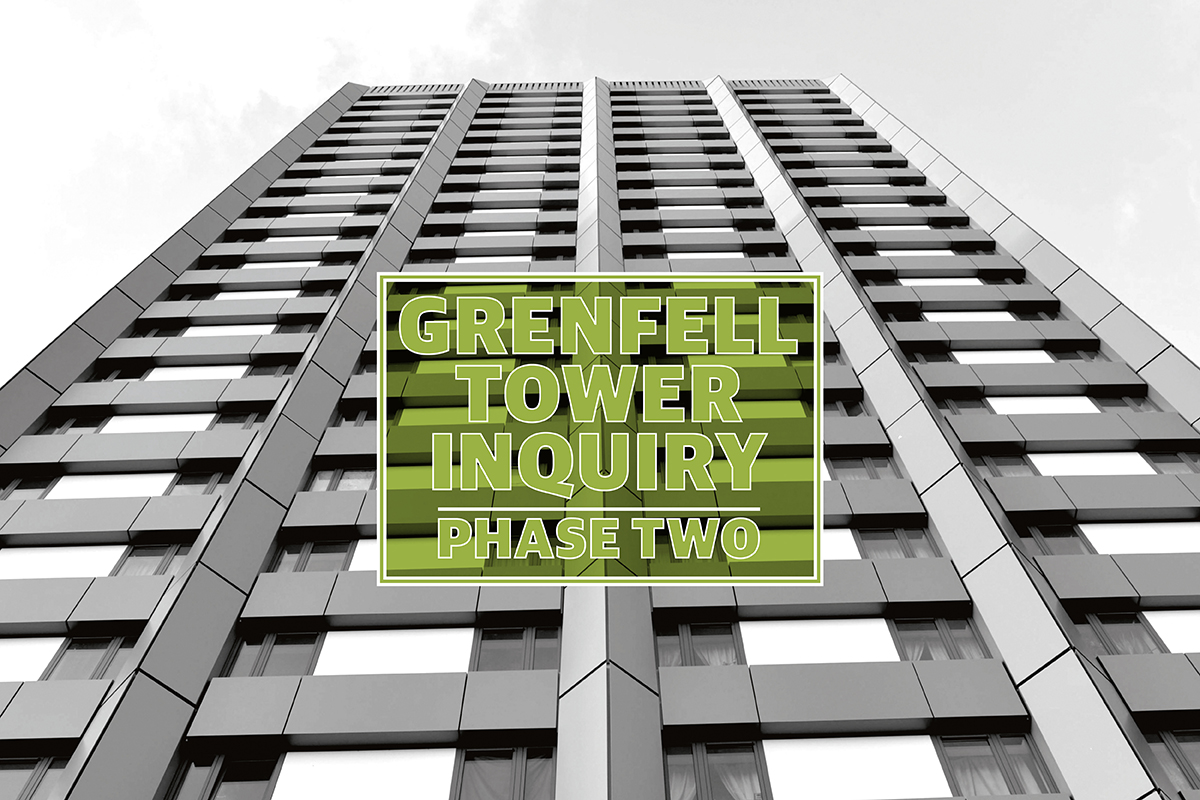

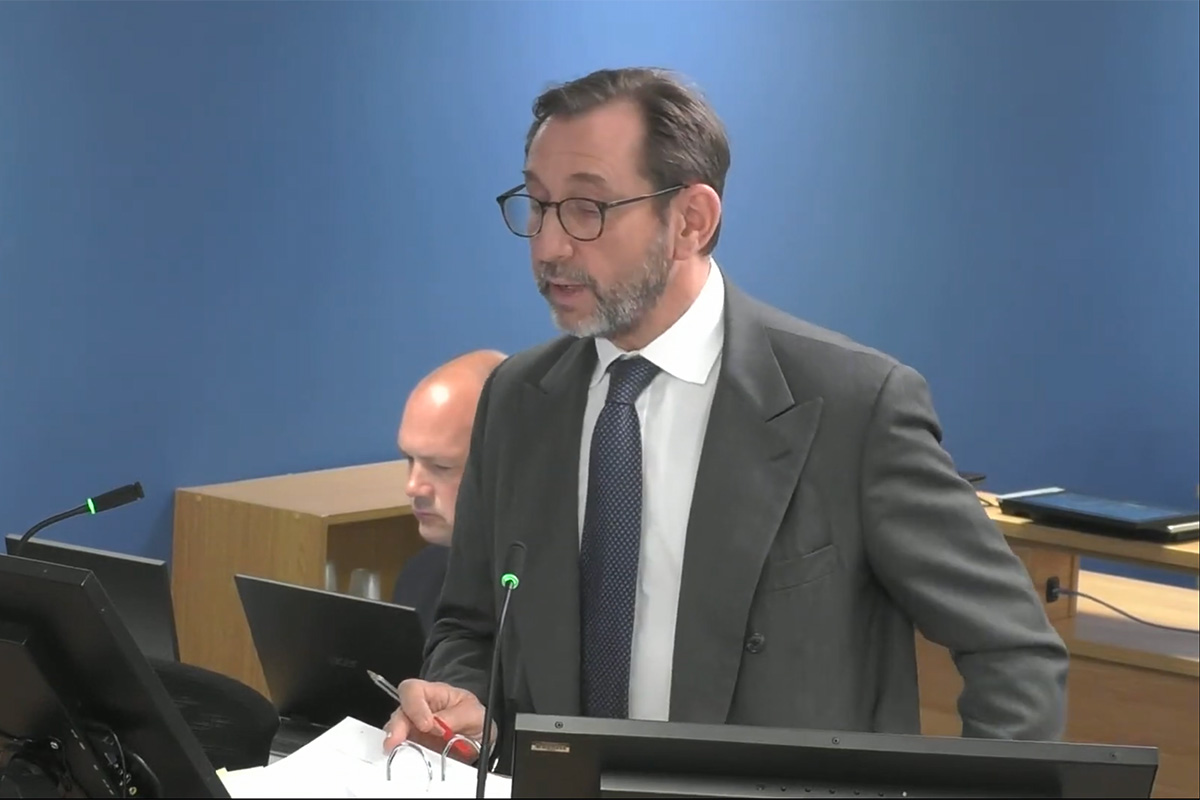
![‘This [the refurbishment] is essentially a £100k gift from the state’ ‘This [the refurbishment] is essentially a £100k gift from the state’](https://omghcontent.affino.com/AcuCustom/Sitename/DAM/159/marshall.png)
